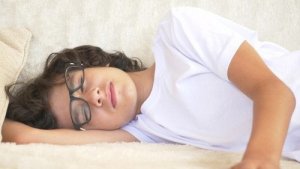Should I Worry About My Teenager Sleeping Too Much?

It’s common to hear parents’ concerns of their teenager sleeping too much. Another common worry is that their child sleeps all day and stays awake all night long.
If you’re worried about your teenager sleeping too much, we want to assure you that you’re not alone. It’s actually quite normal during this stage of life!
Is my teenager sleeping too much?
“I can’t get my teen to wake up and go to school in the morning.” “My kid spends the entire weekend sleeping.” “She’ll fall asleep just about anywhere!” “He always seems tired.” These are all phrases that are popular among parents of teenagers.
Some may say that this habit is an act of simple rebellion. But the fact of the matter is that at a certain age, it’s normal to feel tired all the time.
To understand why, we need to take a look at the internal clock that we all possess. This clock is responsible for regulating body temperature, hormonal changes, appetite and also sleep.
Puberty has an effect on our biological clocks and modifies our times of rest. This means that teenagers may go to bed at 10 pm but not fall asleep until 3 in the morning. So then, when their alarm goes off at 7 o’clock in the next morning, they can’t just bounce right out of bed.
At the same time, it’s normal for them to sleep more during weekends and breaks from school. This is due to the fact that their bodies are, in a way, making up for all of the missed sleep. The same explains why they seem drowsy all the time, and why they fall asleep on the bus, in the car, on the couch, and everywhere else.
Adolescents need to sleep approximately nine hours per night in order to perform well during the day. Don’t forget that, during this stage in life, teens have more activities and obligations than when they were small. They have too many tasks to handle each day!
Lack of rest among youth is often taken lightly, because, after all, they’re young! However, not getting enough rest has many negative consequences. For example, mood swings, behavior problems, learning difficulties, inability to concentrate, and more.

What should I do about my teenager sleeping too much?
As parents, it’s normal to worry when something seems off with our children, no matter how old they are. If you have a teenage child and you feel that he or she is sleeping too much, we recommend the following:
1. Establish a sleep routine
Sticking to a daily schedule is fundamental in order for our bodies to get used to habits and routines. Therefore, determine what time your teen should be in bed and what time he or she should wake up. This includes weekends and vacation as well; don’t allow your child to go to bed more than 2 hours later than during the week.
If your child usually goes to bed at 10 o’clock at night during the week and wakes up at 7 in the morning, then you can make some exceptions over the weekend. However, he or she should go to bed no later than 12 and get up no later than 9 in the morning. Of course, it’s okay to make an exception every once in a while.
“Adolescents need to sleep approximately nine hours per night in order to perform well during the day.”
2. Stay away from caffeine
Many parents don’t allow their children to drink coffee, but they do let their kids drink caffeinated soft drinks. Caffeine doesn’t only affect their rest, but has other negative side effects as well. Be very careful with what your children eat and drink, especially at night.
Also, pay attention to what they eat and drink throughout the day. You may need to make some adjustments and add more fruits, healthy carbohydrates, and soluble fats to boost your child’s energy levels. See a nutritionist to discover what foods your child needs.
3. Say goodbye to long naps
Many teens have a habit of coming home from school and going straight to bed to nap for an hour or two. When they do, it makes it much harder for them to fall asleep at night.
Therefore, afternoon naps shouldn’t last any longer than 30 minutes. This is enough for your child to recharge and go on with the rest of the day.

4. Cut down on technology
Another reason that teens have a hard time falling asleep is due to excessive use of technology. The brightness of computer, cell phone, tablet, etc. screens affects their heart rate and keeps them in a state of alert. Therefore, it’s best for them not to use these devices before they go to bed.
So, when should you become worried about your teenager sleeping too much? Parents should be concerned when their children’s need to rest doesn’t allow them to carry out other activities…
When they fall asleep in class… When all they do is sleep and they still have dark circles under their eyes, pale skin, and major changes in behavior… These are all good reasons to consult your child’s doctor.
It’s common to hear parents’ concerns of their teenager sleeping too much. Another common worry is that their child sleeps all day and stays awake all night long.
If you’re worried about your teenager sleeping too much, we want to assure you that you’re not alone. It’s actually quite normal during this stage of life!
Is my teenager sleeping too much?
“I can’t get my teen to wake up and go to school in the morning.” “My kid spends the entire weekend sleeping.” “She’ll fall asleep just about anywhere!” “He always seems tired.” These are all phrases that are popular among parents of teenagers.
Some may say that this habit is an act of simple rebellion. But the fact of the matter is that at a certain age, it’s normal to feel tired all the time.
To understand why, we need to take a look at the internal clock that we all possess. This clock is responsible for regulating body temperature, hormonal changes, appetite and also sleep.
Puberty has an effect on our biological clocks and modifies our times of rest. This means that teenagers may go to bed at 10 pm but not fall asleep until 3 in the morning. So then, when their alarm goes off at 7 o’clock in the next morning, they can’t just bounce right out of bed.
At the same time, it’s normal for them to sleep more during weekends and breaks from school. This is due to the fact that their bodies are, in a way, making up for all of the missed sleep. The same explains why they seem drowsy all the time, and why they fall asleep on the bus, in the car, on the couch, and everywhere else.
Adolescents need to sleep approximately nine hours per night in order to perform well during the day. Don’t forget that, during this stage in life, teens have more activities and obligations than when they were small. They have too many tasks to handle each day!
Lack of rest among youth is often taken lightly, because, after all, they’re young! However, not getting enough rest has many negative consequences. For example, mood swings, behavior problems, learning difficulties, inability to concentrate, and more.

What should I do about my teenager sleeping too much?
As parents, it’s normal to worry when something seems off with our children, no matter how old they are. If you have a teenage child and you feel that he or she is sleeping too much, we recommend the following:
1. Establish a sleep routine
Sticking to a daily schedule is fundamental in order for our bodies to get used to habits and routines. Therefore, determine what time your teen should be in bed and what time he or she should wake up. This includes weekends and vacation as well; don’t allow your child to go to bed more than 2 hours later than during the week.
If your child usually goes to bed at 10 o’clock at night during the week and wakes up at 7 in the morning, then you can make some exceptions over the weekend. However, he or she should go to bed no later than 12 and get up no later than 9 in the morning. Of course, it’s okay to make an exception every once in a while.
“Adolescents need to sleep approximately nine hours per night in order to perform well during the day.”
2. Stay away from caffeine
Many parents don’t allow their children to drink coffee, but they do let their kids drink caffeinated soft drinks. Caffeine doesn’t only affect their rest, but has other negative side effects as well. Be very careful with what your children eat and drink, especially at night.
Also, pay attention to what they eat and drink throughout the day. You may need to make some adjustments and add more fruits, healthy carbohydrates, and soluble fats to boost your child’s energy levels. See a nutritionist to discover what foods your child needs.
3. Say goodbye to long naps
Many teens have a habit of coming home from school and going straight to bed to nap for an hour or two. When they do, it makes it much harder for them to fall asleep at night.
Therefore, afternoon naps shouldn’t last any longer than 30 minutes. This is enough for your child to recharge and go on with the rest of the day.

4. Cut down on technology
Another reason that teens have a hard time falling asleep is due to excessive use of technology. The brightness of computer, cell phone, tablet, etc. screens affects their heart rate and keeps them in a state of alert. Therefore, it’s best for them not to use these devices before they go to bed.
So, when should you become worried about your teenager sleeping too much? Parents should be concerned when their children’s need to rest doesn’t allow them to carry out other activities…
When they fall asleep in class… When all they do is sleep and they still have dark circles under their eyes, pale skin, and major changes in behavior… These are all good reasons to consult your child’s doctor.
All cited sources were thoroughly reviewed by our team to ensure their quality, reliability, currency, and validity. The bibliography of this article was considered reliable and of academic or scientific accuracy.
- Arboledas, G. P., Andreu, M. M., De la Calle Cabrera, T., Vicario, M. H., Hernández, P. R., Insuga, V. S., & Pérez, J. M. (2014, November). Consenso sobre el uso de melatonina en niños y adolescentes con dificultades para iniciar el sueño. In Anales de Pediatría (Vol. 81, No. 5, pp. 328-e1). Elsevier Doyma. https://www.sciencedirect.com/science/article/abs/pii/S1695403314001593?via%3Dihub
- Navarrete, R. I. A. (2015). Cambios fisiológicos en el sueño. Rev. Ecuatoriana Neurol, 22(1-3), 60-7. http://revecuatneurol.com/wp-content/uploads/2015/06/9-Cambios.pdf
- Poza, J. J., Pujol, M., Ortega-Albás, J. J., & Romero, O. (2018). Melatonina en los trastornos de sueño. Neurología. https://www.elsevier.es/es-revista-neurologia-295-avance-resumen-melatonina-los-trastornos-sueno-S0213485318302007
- Talero, C., Durán, F., & Pérez, I. (2013). Sueño: características generales. Patrones fisiológicos y fisiopatológicos en la adolescencia. Revista ciencias de la salud, 11(3), 333-348. https://www.redalyc.org/pdf/562/56229183008.pdf
This text is provided for informational purposes only and does not replace consultation with a professional. If in doubt, consult your specialist.








